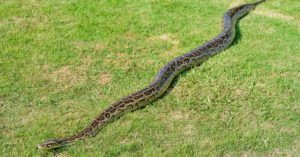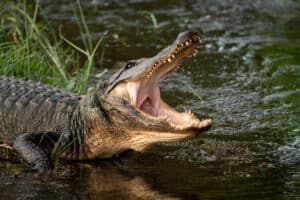Alligators are apex predators that, with their heavily armored skin and mouths full of teeth, look like something straight out of dinosaur days. Their ancestors first evolved 245 million years ago and the crocodilians, including alligatoroids, appeared 80 million years ago. So, these are ancient creatures who know how to survive and thrive. And in the United States, they certainly do thrive. It’s estimated that five million of them live in the southeast, with 1.25 million in Florida alone.
With so many in proximity to people, unfortunate encounters are bound to happen. Florida wildlife officials receive reports of an average of 10 alligator attacks a year, but the actual number may be higher, as some close calls may go unreported. Although in the big picture attacks are rare, if you live near or plan to visit areas with alligators, you should know how to survive an alligator attack.
Key Facts
- Alligators are large reptiles indigenous to the Southeastern United States and Eastern China.
- They are found around marshes, rivers, or brackish saltwater coastal regions.
- They can grow up to 14 feet long and weigh up to 1,000 pounds.
- The natural prey of alligators is basically any animal that will fit in their mouths. The only creatures higher than them on the food chain are humans and maybe some large invasive snakes.
- Alligators avoid humans unless they feel threatened or are protecting their babies.
- They can live up to 50 years in the wild.
- They are no longer endangered and can be hunted with proper permits. They are also raised on farms for commercial purposes.
- Alligator attacks on people are rare but may happen because of intrusion on their habitats and unsafe behaviors, like trying to feed them or take a picture too close to them.
- Backing away or running away in a straight line is the best way to escape and survive an alligator attack.
- If you are grabbed by an alligator, fight aggressively, try to injure sensitive parts of the animal, and roll with it as it twists. These are some of the recommended survival strategies.
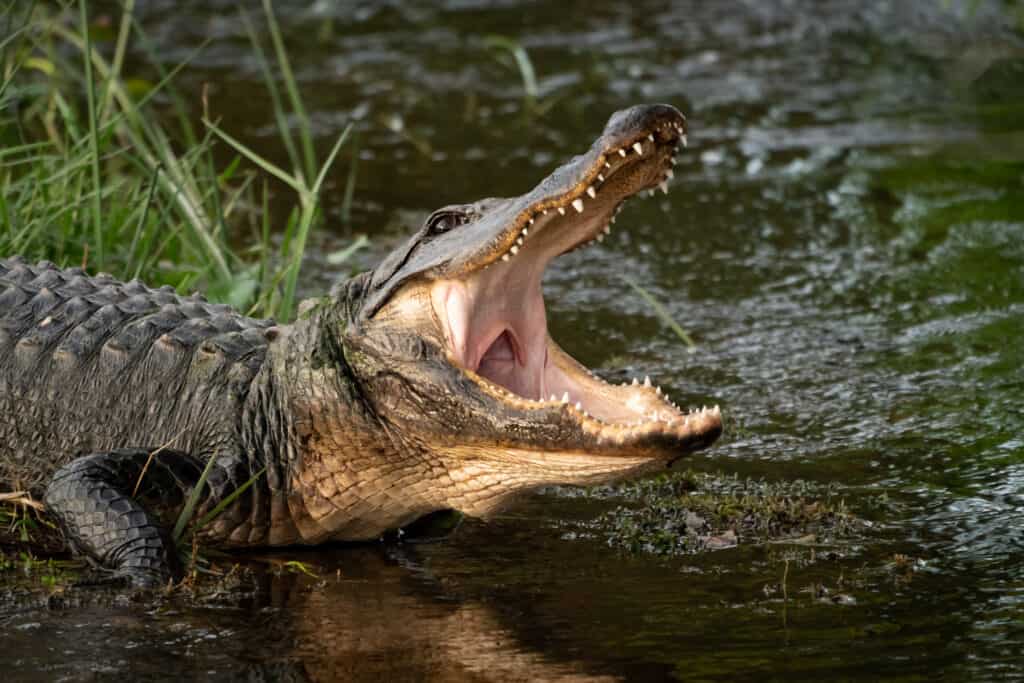
Any standing body of water in Florida could house a gator, making swamps, rivers, lakes, and drainage pools all potentially dangerous.
©Deborah Ferrin/Shutterstock.com
All About Alligators
Alligators are large reptiles in the crocodilian family, which includes crocodiles and caimans. Of the three, crocodiles are the biggest and caimans are the smallest. Alligators get up to 14 feet long and can weigh a hefty 1,000 pounds. There are two species of alligators: American, and Chinese. American alligators can be spotted in all the states of the Gulf Coast as well as Arkansas, a corner of Oklahoma, Georgia, and the Carolinas. They like to live in freshwater swamps and rivers but can also show up in coastal areas with stagnant saltwater. They reproduce by laying eggs, usually 35 or so a year. Unlike many reptiles, the mother defends and cares for her young for the first year after they hatch. This maternal instinct, along with the long lifespan of 50 years of wild alligators, has helped them survive and bounce back from near extinction.
Mature alligators have a mouth full of 80 conical-shaped teeth, and they can replace these if they get broken off. This often happens, so an alligator may go through 2-3 thousand teeth in a lifetime. Their bite is powerful and they use it to hunt virtually any animal they can get into their mouths. For most animals, once you get into those jaws, it’s pretty hard to survive an alligator attack. Fish, birds, mammals up to the size of deer, and other reptiles can all become an alligator’s dinner. They are apex predators, with only humans higher than them on the food chain, but in recent years their dominance in Florida’s Everglades has been challenged by rapidly multiplying large invasive snakes, such as the reticulated python, boa constrictor, and others.
Conservation Status of Alligators
From the 1800s through the mid-1900s American alligators were seriously endangered. Valued for their meat and hides, unsustainable hunting practices reduced their numbers to dangerously low levels. After many years of deliberate conservation efforts, by 1987 the U.S. Fish and Wildlife Service announced that the species had completely recovered. Today alligators can be hunted legally with the appropriate licenses in the states where they live, and they are raised commercially on farms around the country for food and leather production.
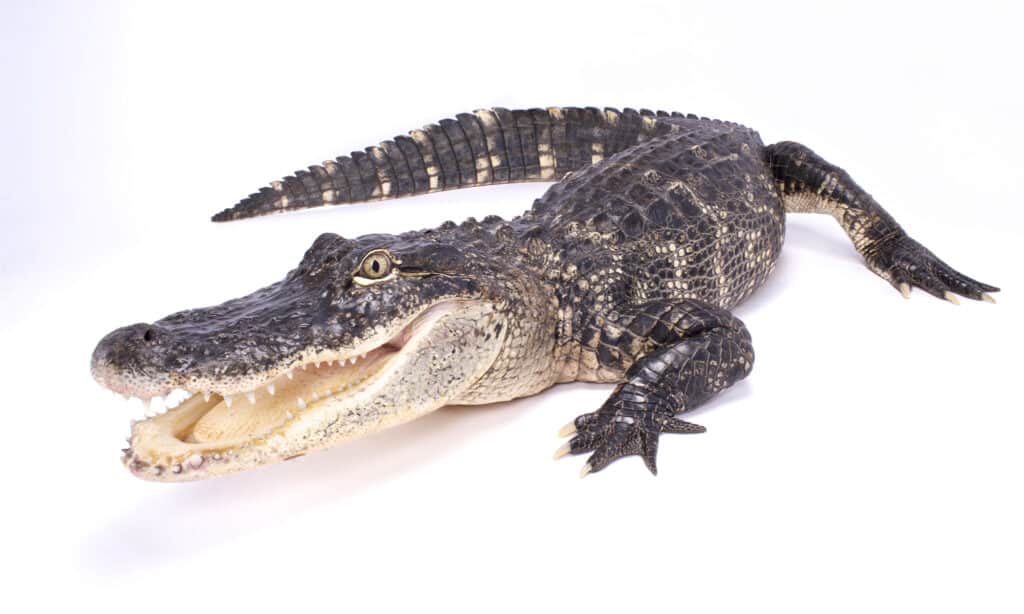
American alligators are significantly larger and heavier than Chinese alligators.
©reptiles4all/Shutterstock.com
What Causes Alligator Attacks?
Alligators usually keep to themselves and avoid people but may occasionally lash out. First of all, both the alligator and the human population have grown tremendously over the past decades. Development has reduced some of the alligators’ natural habitat and brought these two into closer proximity. States like Florida attract large numbers of tourists, and these visitors are usually not as familiar as locals with areas that are not safe and proper precautions to take. On the other hand, local people may have seen alligators many times and grow lackadaisical about the potential danger.
Second, an alligator’s instinctual behavior can create unexpected danger for people who inadvertently cross paths with them. Alligators float in water like submerged logs and can be difficult to see. Swimmers, anglers, and boaters may come upon an alligator without realizing it. People who swim in alligator habitats can be mistaken for prey or aggravate territorial instincts, especially during mating season. People at the water’s edge might accidentally get too close to a submerged alligator or a mom gator defending her young.
Third, careless or thrill-seeking behavior contributes to some attacks. Some people try to feed them or take pictures. Feeding them teaches them to seek out people for food. Some people who see alligators snoozing in the sun may mistakenly think it is safe to get closer to them. Don’t be deceived, though because that sleepy alligator can suddenly burst into a run of 20 mph, and you’d have to be a pretty good athlete to outrun that.
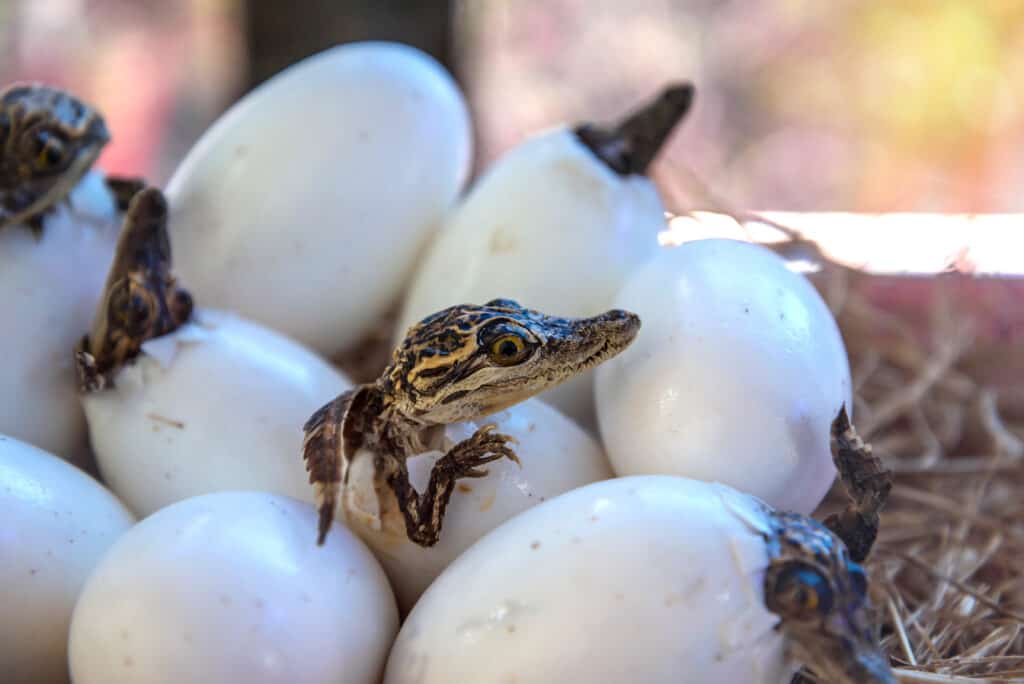
Alligators are more dangerous during mating season or when they are defending their young.
©iStock.com/Casanowe
How to Escape and Survive an Alligator Attack
If you are unfortunate enough to get on the wrong side of an aggressive alligator, you have to think and act quickly. Remember these tips:
- Stay away from alligator habitats, especially during mating season.
- Back away slowly if you see an alligator, even if it appears to be sleeping.
- Run away in a straight line (not a zigzag) if the alligator makes any aggressive move. They can run fast, but only for short distances.
- If an alligator grabs you, fight aggressively, aiming for its eyes, nose, or throat, which are its most sensitive areas. Hit, kick, or jab as hard as you can to get it to release its grip.
- Try to create a gag reflex by jabbing any object you can reach into the back of the alligator’s throat.
- When alligators bite, they twist and roll to inflict greater injury. If the alligator has grabbed your arm, you might try to grab the alligator with your other arm and roll with it to help minimize the injury.
- An alligator sometimes momentarily releases its jaws to adjust its grip on its prey. If it does, that’s your moment to pull free and escape.
Report the Incident
A final tip to survive an alligator attack is to seek immediate medical attention and to report your encounter to wildlife authorities. Even if you have sustained only a minor scratch, alligators carry infection, and your doctor might want to put you on a round of antibiotics. And wildlife officials need to know if there is an aggressive gator in the area so that the public can be warned, and the animal caught and relocated or euthanized. Alligators are fascinating, but like all large carnivores, are best enjoyed at a safe distance.
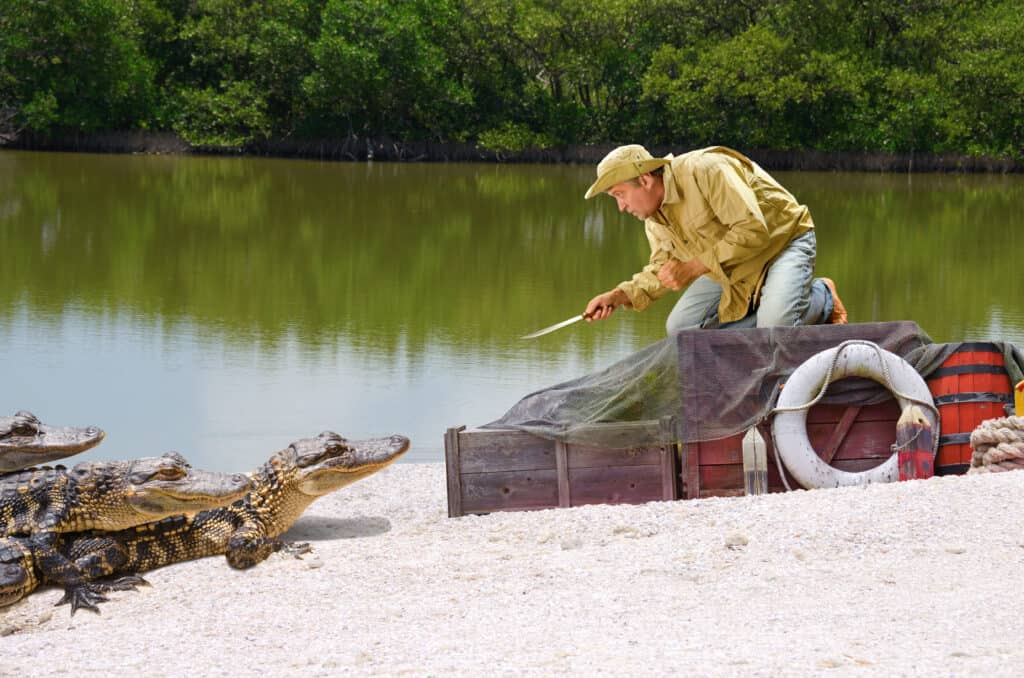
If you encounter an alligator, back away slowly. If one grabs you, hit or poke it in the eyes, nose, or throat with your hands.
©Michael O’Keene/Shutterstock.com
The photo featured at the top of this post is © David Louis Tiffany/Shutterstock.com
Thank you for reading! Have some feedback for us? Contact the AZ Animals editorial team.



